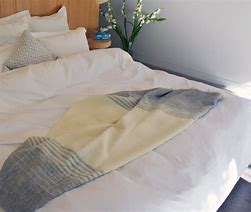Inspired to find the naturally better way: conversation with Russell Lamb, founder of Ecodownunder.
The world seemed focused on synthetics and creating “new” plastic textiles which flooded the market from China. By the mid-90s, thanks to technology and the growth in demand for cheaper man-made fibres, it was virtually impossible to find good quality, pure cotton sheets in Australia.
Born at the foothills of the mountains backing onto Fiordland in New Zealand, it’s no surprise that Russell wasn’t comfortable with the synthetics boom. He and his three brothers grew up by the ocean, disappearing when the school bell rang on a Friday, to explore the beaches and bluffs of this remote and rugged coastline, returning home only to get some sleep before school on a Monday. Long summer holidays were spent working on a cousin’s farm. Some of his earliest memories conjure up images of collapsing exhausted, hot and sweaty, in the hay bales after a long day shearing sheep. To him, at times it feels like yesterday and the memories are vivid.
Those heady days came to a sudden end when school finished and he had to work full-time so that he could study at night. With a degree under his belt, he arrived in Australia 25 and broke. It didn’t take long to land his first job with the NZ founder of wool underlays. A few years later, he joined a business which imported lower quality, synthetic products from China but he didn’t feel right about it.
The freedom to roam the bush and beaches of the southern tip of South Island, had left Russell with a strong connection to the natural world and it seemed clear to him that natural fibres were the way to go. “Everyone was focusing on synthetics and the fastest way to turn products around at the lowest cost. Australia was being flooded with low quality, chemically coated sheets from China. It was a no brainer to me. Sleeping in synthetics just didn’t feel comfortable”.
Never afraid to follow his instincts, which he confesses has got him into some interesting situations over the years but concludes “things invariably work out when you’re true to yourself.”
And Ecodownunder was born.
Just a concept at first, “eco in our name meant to be naturally better, to use no synthetics, no harsh chemicals, nothing made in China. Australian made where possible” and the start of a long journey with a string of failures along the way!
The dream seemed simple: to create homewares from natural fibres, grown without harsh chemicals and pesticides, made into products using natural processes. But organically grown cotton was virtually unheard of at the time. Mention of it was generally met with no interest or raised eyebrows at best. But he was not deterred as he was certain it was the right path to take.
The hunt began for organic cotton which didn’t exist on a viable scale in Australia. The search took them to remote farms in northern NSW and Queensland, to an anthropologist working with farmers in Peru who had discovered naturally coloured cotton seeds in mummy wrappings. The trail moved to another farmer in Northern California, who was growing naturally coloured cotton and producing cotton fabric. They trialled organic cotton from Turkey, talked to cotton producers in Pakistan and India.
“The concept of organic was not deemed commercial and we were viewed as time wasters. I’ve always been determined to find what I’m looking for and this was no exception.”
Research around the world was followed by a string of time-consuming failures! They partnered with a farmer in NSW to grow their own cotton crop in Australia. 6 months later, the crop failed, and a lot of money went too!
They then found naturally coloured Australian cotton, which of course was reddish brown. But it was evident that no one liked the colour! And the fact that the towels were made without using toxic dyes was clearly not enough to help sell the towels back in the 90s!
They decided to try making sheets, with naturally coloured cotton from Queensland which they sent to a cotton factory in Pakistan, but the colour failed again and just looked washed out and dirty.
Their long search continued for naturally coloured cotton and ended successfully in the middle of where Russell describes as “nowhere!” They found darker naturally coloured cotton in Arizona, which they were optimistic could be spun and woven to make sheets! They bought some cotton, shipped it to Pakistan to have it spun and woven. It made beautiful sheets which customers loved, at first. But the pigment in naturally coloured cotton is not stable and the cotton faded in the sun, although the colour returned when the fabric was washed.
“We spent 3 years getting this far but realised these sheets were just not going to be good enough.”
Finding desirable naturally coloured cotton unearthed an interesting correlation between cotton fibre length and colour. Russell explains “the brighter coloured cottons seemed to have shorter fibre lengths, which made sense when you look at the traditional rich, bright colours used by the Mayans which created a coarser fabric. We needed long staple fibres to create quality cotton in desirable colours!”
“These failures made them more determined to give people better sleep, naturally.
To do this we just needed to create bedding without using synthetics and harsh chemicals.”
Like many things, their no 1 bestselling eco cotton sheets happened by accident. People wondered why these sheets were so wonderful to sleep in. It was because of the things they didn’t do; they weren’t coated in chemicals so they could breathe, and they were made without blending the cotton with polyester. By eliminating harsh chemicals, they had inadvertently created what has become their most popular sheet! The soft smooth finish of eco cotton became their signature.
“We knew we’d created great sheets when people came back to buy more.”
The search for quality organic cotton ended in India where they finally found a partner who was able to produce Ecodownunder’s organic cotton bedding and maintain the quality they had committed to at an affordable price. In producing organic cotton sheets, they again had a lucky break, as they were the perfect alternative to eco cotton sheets. As Russell explains “our eco cotton has a soft, smooth, almost silky feel but some people prefer a crisp hotel finish which is why they choose our organic cotton sheets.”
The eco in Ecodownunder continues to be at the heart of the business as they develop their natural range of bed and bath linen which uses either organic or eco cotton.
“We know we’re not perfect, but we continually assess and look to improve the way we do things at every level of the business. A high for us was eliminating single use plastic from our stores. We redesigned our packaging and our bedding is now delivered to customers in organic cotton reusable shopping bags.
We’re a family run Australian business, and live, work and spend any spare moments by the sea. It’s why we’re so passionate about alternatives to synthetics and plastics. Between us, we’re on the water most days, surf boat rowing somewhere between Palm Beach and Manly, depending on surf and wind conditions! Every day we become more determined as we see particles of plastic stuff floating in the ocean and washing up on our beaches.
Downunder – we produce within Australia when it makes sense to do so. Our comfort range uses the finest natural fibres, made in Australia, which we believe grows the best wool to be found anywhere in the world.
Ecodownunder | Since 1997
25 years ago we couldn’t find luxurious pure cotton sheets that were not blended with synthetics and produced without harsh chemical treatments. Frustration at the poor quality of bed and bath products available in Australia was the impetus for Ecodownunder, and the creation of the best quality bed and bath collection made without harsh chemicals and synthetics.
For more information, head to their website.





 News4 days ago
News4 days ago


 News4 days ago
News4 days ago


 Tech1 day ago
Tech1 day ago


 News4 days ago
News4 days ago


 News5 days ago
News5 days ago


 Property18 hours ago
Property18 hours ago


 News1 day ago
News1 day ago


 Leaders5 days ago
Leaders5 days ago






